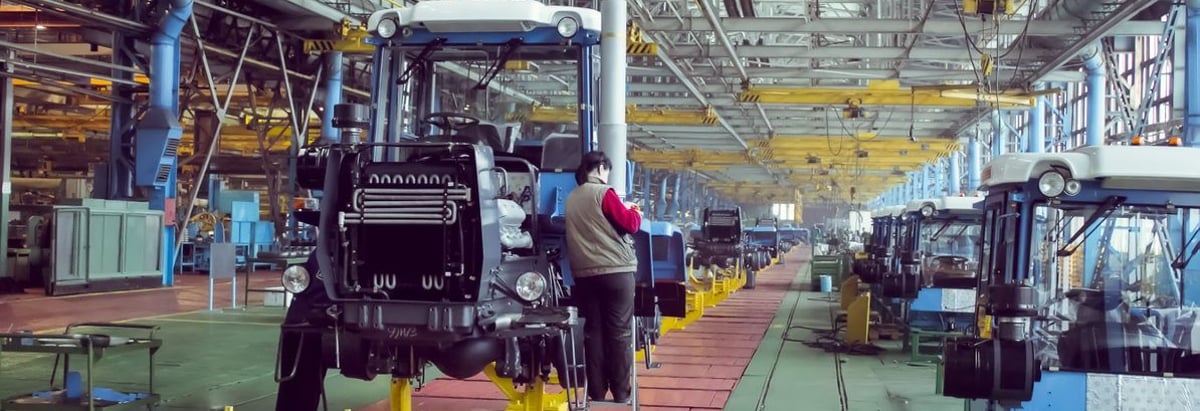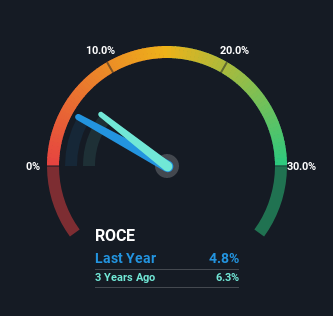Investors Could Be Concerned With Jain Irrigation Systems' (NSE:JISLDVREQS) Returns On Capital

To avoid investing in a business that's in decline, there's a few financial metrics that can provide early indications of aging. A business that's potentially in decline often shows two trends, a return on capital employed (ROCE) that's declining, and a base of capital employed that's also declining. Ultimately this means that the company is earning less per dollar invested and on top of that, it's shrinking its base of capital employed. In light of that, from a first glance at Jain Irrigation Systems (NSE:JISLDVREQS), we've spotted some signs that it could be struggling, so let's investigate.
Return On Capital Employed (ROCE): What Is It?
If you haven't worked with ROCE before, it measures the 'return' (pre-tax profit) a company generates from capital employed in its business. Analysts use this formula to calculate it for Jain Irrigation Systems:
Return on Capital Employed = Earnings Before Interest and Tax (EBIT) ÷ (Total Assets - Current Liabilities)
0.048 = ₹3.7b ÷ (₹125b - ₹50b) (Based on the trailing twelve months to September 2022).
Thus, Jain Irrigation Systems has an ROCE of 4.8%. Ultimately, that's a low return and it under-performs the Machinery industry average of 15%.
Check out our latest analysis for Jain Irrigation Systems

Historical performance is a great place to start when researching a stock so above you can see the gauge for Jain Irrigation Systems' ROCE against it's prior returns. If you want to delve into the historical earnings, revenue and cash flow of Jain Irrigation Systems, check out these free graphs here.
So How Is Jain Irrigation Systems' ROCE Trending?
There is reason to be cautious about Jain Irrigation Systems, given the returns are trending downwards. To be more specific, the ROCE was 8.5% five years ago, but since then it has dropped noticeably. On top of that, it's worth noting that the amount of capital employed within the business has remained relatively steady. Since returns are falling and the business has the same amount of assets employed, this can suggest it's a mature business that hasn't had much growth in the last five years. If these trends continue, we wouldn't expect Jain Irrigation Systems to turn into a multi-bagger.
The Key Takeaway
All in all, the lower returns from the same amount of capital employed aren't exactly signs of a compounding machine. We expect this has contributed to the stock plummeting 77% during the last five years. With underlying trends that aren't great in these areas, we'd consider looking elsewhere.
If you'd like to know more about Jain Irrigation Systems, we've spotted 3 warning signs, and 1 of them doesn't sit too well with us.
For those who like to invest in solid companies, check out this free list of companies with solid balance sheets and high returns on equity.
New: Manage All Your Stock Portfolios in One Place
We've created the ultimate portfolio companion for stock investors, and it's free.
• Connect an unlimited number of Portfolios and see your total in one currency
• Be alerted to new Warning Signs or Risks via email or mobile
• Track the Fair Value of your stocks
Have feedback on this article? Concerned about the content? Get in touch with us directly. Alternatively, email editorial-team (at) simplywallst.com.
This article by Simply Wall St is general in nature. We provide commentary based on historical data and analyst forecasts only using an unbiased methodology and our articles are not intended to be financial advice. It does not constitute a recommendation to buy or sell any stock, and does not take account of your objectives, or your financial situation. We aim to bring you long-term focused analysis driven by fundamental data. Note that our analysis may not factor in the latest price-sensitive company announcements or qualitative material. Simply Wall St has no position in any stocks mentioned.
About NSEI:JISLDVREQS
Jain Irrigation Systems
Manufactures and sells micro-irrigation systems in India, Europe, North America, and internationally.
Adequate balance sheet and slightly overvalued.
Market Insights
Community Narratives



